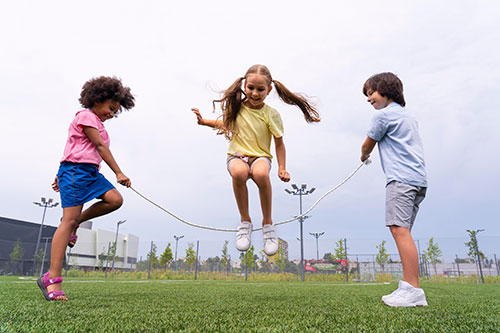Importance of Physical Activities in a Child’s Development
All Work and No Play, Makes Jack a Dull Boy!
Thanks to COVID-19 and the resultant lockdown, children have been confined to their homes for the last 2 years. I often come across kids who are addicted to smart phones, video games and YouTube videos. They show poor interest in initiating conversations or even maintaining eye contact. Moreover, lack of space in residential apartments and increased academic pressure in schools have made children miss out on their daily dose of physical exercise. The increased exposure to online content makes them sedentary, which is not a positive factor when it comes to their overall health. Physical activity plays a vital role in this scenario. Any form of exercise, say running, jumping or swimming, in the initial years can enhance their physical, mental and emotional well-being. I thought it fit to enlist some of the benefits of physical exercises in children:

- Growth: Developing a good physical foundation at a young age helps them to have healthy and strong bones as well as adequate growth (height and weight appropriate for age), thereby reducing the risks of bone-related diseases in the later part of life.
- Development: Physical activity helps in the development of fine motor skills (involving hands and fingers) and gross motor skills (involving the whole body) like standing, jumping and kicking. Developing gross motor skills also helps in hand-eye coordination, balance and strengthens the neural pathway to the brain.
- Posture: Physical exercise helps with posture by increasing core and spinal strength.
- Cognitive Development: During exercise, the nerve cells in the hippocampus and prefrontal cortex of the brain are triggered to multiply and form new connections. This results in improved concentration and better memory thereby helping school-going children to perform well in their academics.
- Obesity: Physical activity burns excess calories, thereby reducing obesity and preventing cardiovascular diseases and diabetes in later years.
- Stress: Exercises reduce the symptoms of stress, anxiety and depression and boost self-esteem in children. It also helps them stay focused and grounded.
- Leadership Qualities: Team sports help in building trust, partnership and leadership, imparting important life-time lessons. It is in our own interest to ensure that children engage themselves in the following types of exercises:
- Aerobics: Focus on building stamina. E.g., Cycling, swimming, etc.
- Strength Training/Weight Training: Focus on building strong muscles and bones. E.g., Push-ups, squats, etc.
All these developmental benefits arising out of exercise have a significant impact on their long-term health. Whether your child is a toddler, preschooler, primary school or secondary school student, physical activity deserves an important spot in their welfare and should never be compromised at any cost. Let us facilitate children to enjoy their share of exercise every day.
Dr. Pushkala.M.S.
MBBS, MD (Pediatrics), PGDID (UNSW- Australia), PGPN (Boston)
Kauvery Hospital, Chennai


